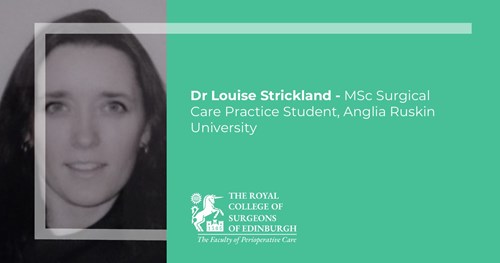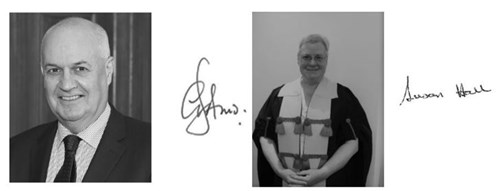Menu

We are delighted to be able to update you on the Faculty of Perioperative Care as we approach completion of its 5th year since its beginning in 2016. During this time there has been increasing recognition about the important part played by all the members of the extended surgical team across all specialties, but no more so than over the past year where the many benefits of having experienced practitioners such as Surgical Care Practitioners (SCP), Advanced Clinical Practitioners in Surgery (ACP) in the team has been recognised.
Redeployment to other areas such as critical care, running minor injuries clinics and being rostered into a surgical rota are a few examples of the adaptability of a practitioner who can work either to a medical or nursing model of care during such a crisis. Surgical First Assistants (SFAs) have also faced many challenges with the new ways of working mandated by the COVID-19 pandemic, particularly with the contracts between the Independent sector and NHS. In both sectors established SFAs and new trainees have been re-deployed outside the operating department and concerns have been expressed about a loss of assisting hours and achievement and maintenance of clinical competence.
One of the principle aims of the Faculty was to provide educational opportunities specifically for non medical practitioners in surgery as this had been previously lacking. It’s pleasing to be able to report that prior to the suspension of face to face teaching and learning, courses such as PINTS, Leadership and the Skills courses were particularly well attended with excellent feedback; as have the workshops on topics such as surgical assistance. We have now run five Annual Conferences in Birmingham often combined with opportunities for social networking. The poster competition provides practitioners with an opportunity to showcase their involvement in research. Attendance at the conference is usually over 100 delegates. Once again, the feedback has been excellent but apart from the educational value, the ability to make contact with colleagues in similar roles from other Trusts and Health Boards has been another consistent comment of positivity.
Since the onset of the COVID-19 pandemic, however, the delivery of education has had to change. RCSEd has been at the forefront of webinar development for surgeons and other members of the EST and of course access to the webinar archive is one of the benefits of being an Affiliate, Member or Fellow of the Faculty. A series of webinars specifically for non medically qualified practitioners on a variety of topics was developed and delivered in 2020. The subjects chosen were: 'Auditing my Surgical Practice as a Practitioner', 'COVID-19: The value of the advanced practitioner in the surgical team' and 'Assessment of the risk in the surgical patient: what the practitioner should know'. The Faculty Conference, 'The Perioperative Practitioner: what are the future developments for the extended surgical team', was also held virtually in November 2020. The Executive Committee would like to invite you to put forward topics for future webinars.
The Faculty continues to have a very good relationship with the three universities running the MSc courses for SCPs. A partnership agreement allows the trainees in their first year to have free Affiliate membership of the Faculty with the associated benefits and we are extremely grateful to Frances Page and Susan Hall, Anglia Ruskin University, Bhuvana Bibleeraj, Edgehill University and Toby Rankin, Plymouth University for facilitating this at the beginning of each course. The membership of the Faculty is, of course, open to any practitioner who provides assistance in surgery and the details of joining are on the Faculty website as well as the updated e version (2021) of the Faculty brochure.

Dr Louise Strickland, a student on the MSc Surgical Care Practice delivered by Anglia Ruskin University had this to say about Faculty membership:
“I think the Faculty provides an excellent educational meeting ground for all surgical assistants and SCPs within the Royal College of Surgeons of Edinburgh. The continuing education opportunities are plentiful. I have been to an anatomy class for surgical first assistants in Edinburgh, virtual sessions on human factors and patient safety. Even in the midst of the pandemic, we were all able to gather online for the Annual Faculty conference on 20th November 2020.
There are many benefits to being a member of the Faculty. A very pragmatic one is having access to the Acland Anatomy atlas. This provides in-depth knowledge and visualisation of specific anatomy in 3D which can help prepare for cases especially in a new specialty.
Being able to stay connected and up-to-date with challenges facing colleagues during this pandemic was facilitated in part though the Faculty. It has given regular updates by email and provided online learning webinars and conferences for its members.
An additional benefit, is that as a trainee SCP the online e-log book is great for keeping track of cases and clinical hours.”
Surgical First Assistant trainees undertaking a course at a Higher Educational Institute (HEI) are entitled to a reduction on their affiliate membership fee as are members of AfPP in good standing. We are also exploring an International arm of the Faculty and in February 2020, Sri Rathinam and Bhuvana Krishnamoorthy gave presentations about the Faculty and the Cardiac Exit Exam to the Annual Conference of the Indian Association of Cardiothoracic Surgeons as well as conducting a survey of Indian Surgical Physician Assistants which indicated that 90% of Physician Assistants in India would be keen to join. Surgical First Assistants, providing as they do non interventional surgical assistance, are a group of practitioners unique to the United Kingdom, however there are many countries where some of the duties of an SFA are incorporated into perioperative nurse training and this is another potential area for growth.
SCPs are one of the four professional groups belonging to the Medical Associate Professions (MAP) and although statutory regulation was not granted on this occasion by the Government, the Royal College of Surgeons of England (RCSEng) and the Royal College of Surgeons Edinburgh (RCSEd) are keen to see this to come to fruition. In the past few months, a RCSEng/ RCSEd Project Board for the Extended Surgical Team has been created supported by the Presidents and Office Bearers of both Colleges to progress this. The project will involve:
1. The development of an improved curriculum to support existing SCPs and the provision of a future route to facilitate direct entry.
2. The development of a Managed Voluntary Register for SCPs. This project is an exciting development, will be run on a bi-collegiate basis with RCSEng and RCSEd equal partners in all aspects of this development and in collaboration with a range of external stakeholders. To date, there have been three productive meetings of the Board and the Faculty membership will continue to be updated.
I am also pleased to inform you that as a member of the HEE Medical Associate Oversight Board (MAOB) we are working on a career framework for MAPs which will allow a practitioner such as a SCP progress from SCP through to advanced level and ultimately a Lead or Consultant role. It is important to not only recognise the MAP role but to create a pathway for MAP career progression. One of the steps in this process is to develop the skills and knowledge which each of the roles require and recently Skills for Health have commissioned HEE to lead this framework development process which I (CA) will be involved in.
It is important for membership of the Faculty that RCSEd, through the Faculty of Perioperative Care, recognise that SFAs and all the advanced practitioner groups in surgery are extremely important members of the modern surgical team and that RCSEd are working closely with external organisations such as other Surgical Colleges, HEIs running university programmes and HEE to not only provide the educational and training support but also to develop national standards and career development.
On a personal level, Susan Hall finds the resources offered by both the Faculty and wider Royal College of Surgeons of Edinburgh incredibly helpful:
"As a Nursing & Midwifery Council Registrant it is important that I continue to undertake CPD that is relevant to my role. As an academic I find that the webinars that have been delivered over the period of national lockdown have enabled me to ensure that I remain current with emerging surgical technology, human factors, legal matters, COVID-19 related matters, and, through the Regional Surgical Advisor webinars for medical students, patient management. Without my membership of the FPC I would be a less rounded professional."
Members of the Executive Committee of the Faculty contribute to the deliberations of the Perioperative Care Collaborative and have been engaging with HEIs who deliver SFA education to make them aware of the opportunities for continuing professional development provided by the Faculty. The challenges of national lockdown and the need for social distancing has, of necessity meant that these interactions have, over the past 10 months, been virtual. At present there is no move towards separate regulation for SFAs as the majority of practitioners provide this service for only part of their contracted weekly hours, however the resources offered by the Faculty and the recommendations made by HEE on appraisal and clinical skills assessment for SCPs could also be applied to SFAs across the wide spectrum of surgical specialties assisted by them and thus support them in meeting the expectations of their regulators.

Charles Auld, Faculty of Perioperative Care Lead RCSEd
Susan Hall RGN MSc FHEA FFPCEd, Admissions Tutor & Associate Lecturer MSc Surgical Care Practice, Anglia Ruskin University